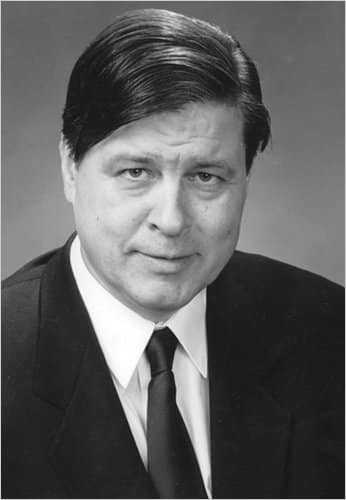Catholic journalist Joe Sobran, who has been called one of the best writers of our time, died on September 30, 2010 in Fairfax, Virginia from complication of diabetes. He was just 64. Unlike the other two members of my triad of writing influences, I knew Joe personally and had the pleasure of his company on at least three highly memorable occasions.
My late wife and I took him and his longterm friend and business associate, Fran Griffin, to dinner in the dining room of the historic Willard Hotel a good stone’s throw from the White House. I do not remember what we talked about about but just being exposed to his literary aura was enough to inspire the passions of my writing soul.
 Like all good writers, Joe was well-versed in not just the issues of the moment but had a vast reservoir of intellectual resources that were at the beck and call of his quick witted mind. He loved Aquinas and above all, William Shakespeare. His affection for the bard aroused his detective’s nose to sniff out what may have been one of the great conspiracies or hoaxes in the Western Canon.
Like all good writers, Joe was well-versed in not just the issues of the moment but had a vast reservoir of intellectual resources that were at the beck and call of his quick witted mind. He loved Aquinas and above all, William Shakespeare. His affection for the bard aroused his detective’s nose to sniff out what may have been one of the great conspiracies or hoaxes in the Western Canon.
After reading about his paucity of formal education and failure to travel widely on the Continent, Sobran concluded that there was no possible way that the playwright from Avon could possibly have written such beautiful dramatic prose and poetry.
If not Shakespeare, then Who? Christopher Marlowe was often offered but without any convincing evidence. Sobran sniffed out Edward de Vere, the 17th century Earl of Oxford. According to Sobran, the proof is simply based on sociology and simple realism. De Vere had the educational and traveling background to write these plays. Some even reflect his life in detail. For having had the effrontery to attempt to upset the applecart of the Western Canon, Soprano engendered the opprobrium of countless critical scholars.
But controversy was never foreign to Sobran’s career. He had alienated religious and Jewish groups for his opposition to Islam, long before 9/11. The latter cost him his dream position at William F. Buckley’s National Review. Buckley had been Joe’s inspiration as a teen and his mentor while at the magazine.
Very quickly Sobran found himself on the outside looking into the Conservative surroundings that had made him part of the establishment. Being part of any establishment, save maybe his Catholic Church, was no place for his independent way of thinking. Years later when Conservatism proved itself to not really stand for any of the permanent things of Edmund Burke and his 20th century accolade, fellow Catholic convert, Russell Kirk, Joe started calling himself a reactionary utopian.
What really upset Sobran was the Leviathan state of Thomas Hobbes that was now the prime disposition of the S.S. government. Sobran cited the thinking of 19th century philosopher, Frederic Bastiat, who wrote that government was nothing more than organized plunder. The Frenchman often quipped that if he or I ever did to each other what government does to its citizens, we would be in prison. Joe spent the rest of his days working to thwart the will of the big whale.
He loved his Catholic Faith dearly. For more than 20 years Sobran wrote the weekly Washington Watch column for The Wanderer newspaper. He also wrote for Human Life Review and Celebrate Life!, the magazine of the American Life League, in addition to Chronicles: A Magazine of American Culture.
Sobran’s writing style reflected what my Graduate School professor called Hemingwayesque economy of verbiage. He waxed lyrically on a variety of mostly moral issues from abortion, slavery, the death penalty, and anti-Catholic bigotry. Even when I might disagree with Joe on ideas , such as the death penalty, it was very hard for me to dismiss his logical reasoning. I never have felt that his emotions where the driving force of his writing. Of course, like any other human, he had deep passions and feelings but they never seemed to affect his intellectual positions.
Sobran directed most of his passion toward his Catholic Church, the last bastion of permanent truth in this country. It pained him dearly when charlatan and born-again heretics invaded the Church with their twisted ideas and soppy morals. Joe relished the Church’s strange moral authority precisely because it contradicted the oil of pseudo intellectual interlopers.
To Sobran this just may be the reason so many of us believe in her. The Church also offers a complete and comprehensive morality, one which most of us still recognize as the faith of our fathers. He lamented the fact that so many other churches had adopted every new moral fad. G. K. Chesterton, also another convert and another one of his favorites, wrote something similar when he shared, fallacies do not cease to become fallacies because they become fashions.
However the best benefit of reading Sobran is that thanks to all of his mentors, muses and inspirations, the reader feels that he is being exposed to to a beautiful garden of ideas, wisdom and wit. Sometimes it is the last that completes the picture. Let me end with a repetition of one of his many favorite stories, so Chestertonian in tone. A speaker concluded his talk in London with a Biblical adaptation. The speaker explained that he had been casting his pearls before swine, when a heckler yelled, Fake pearls. The speaker retorted, but real swine!
That is why Joe Sobran loved to write and why countless people have and still read his pearls.








